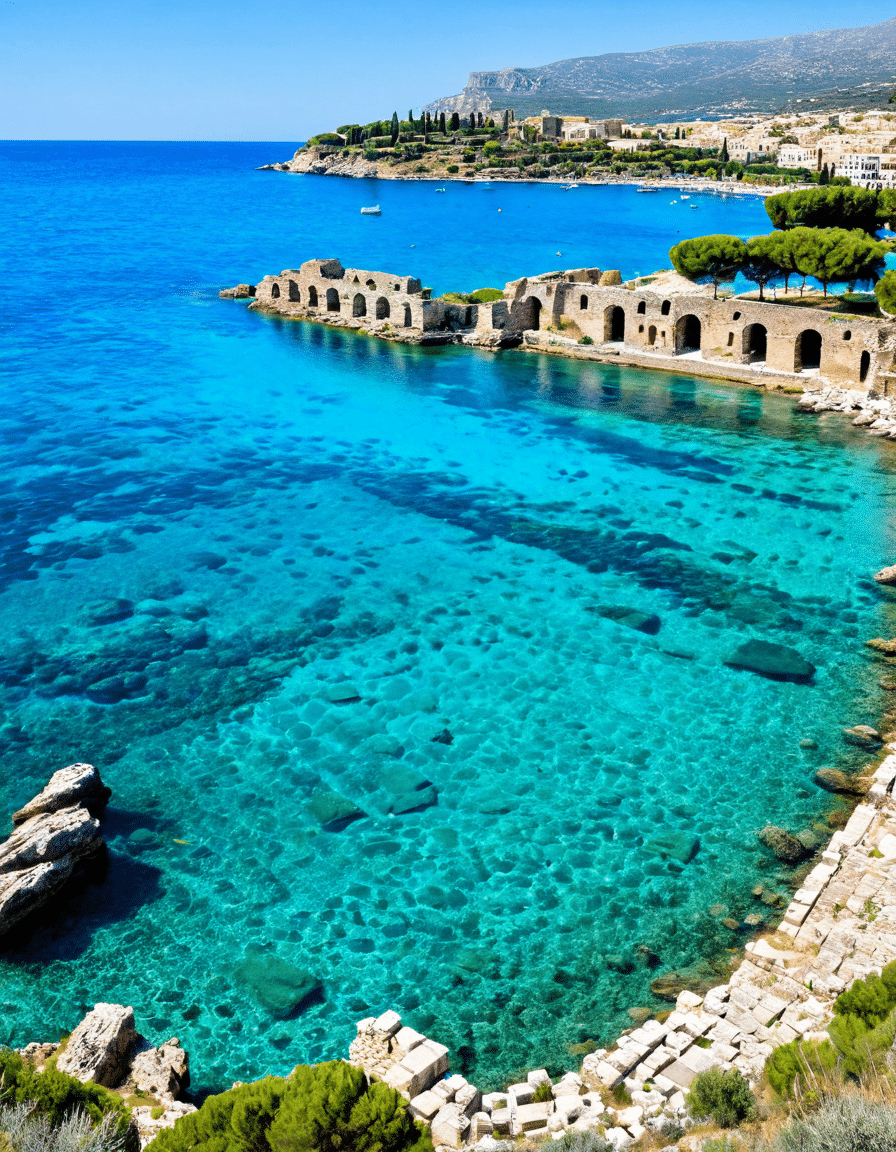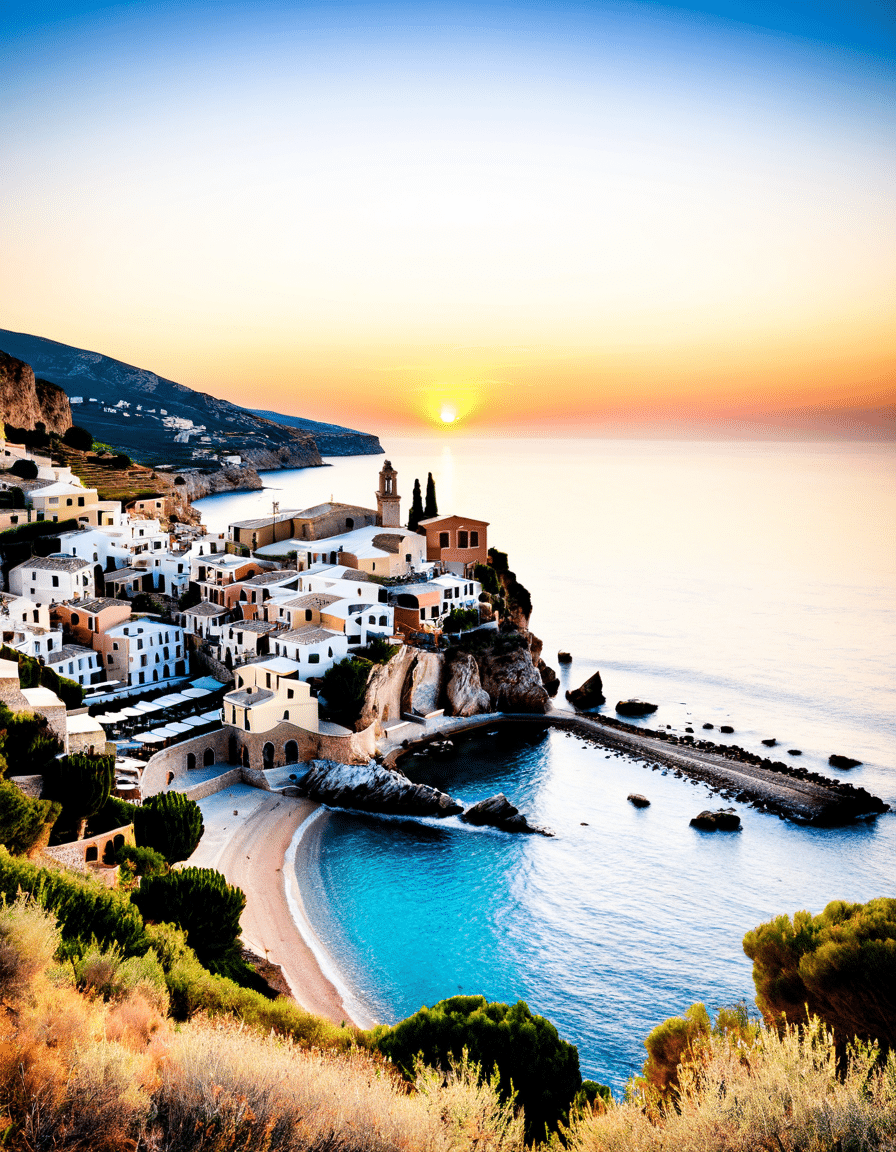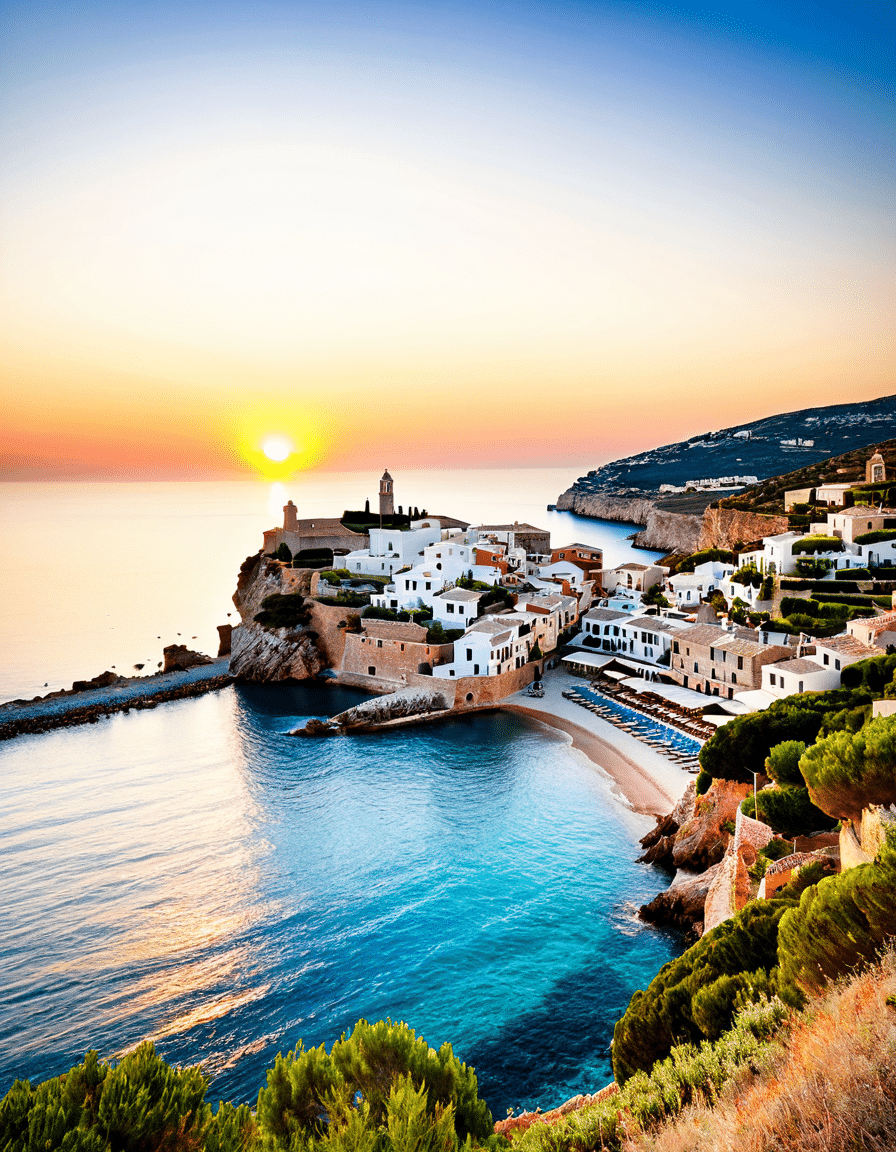The Mediterraneo region is an intricate collage of cultures, traditions, and histories that stretch back millennia. Renowned for its breathtaking landscapes and vibrant communities, this area has nurtured some of the world’s most influential civilizations. From ancient Greece to the bustling modern metropolises of today, the Mediterraneo continues to evolve and inspire. Dive with us as we explore the top cultural influences that have helped shape this storied region.

1. Top 7 Cultural Influences Shaping the Mediterraneo Region
1.1 Ancient Civilizations: The Birthplace of Democracy
The Greeks laid the groundwork for modern democracy right in the Mediterraneo. Athens, often referred to as the cradle of political thought, introduced concepts of governance that continue to impact nations worldwide. Philosophers like Socrates and Plato fostered rich dialogue about ethics and governance, encouraging citizens to think critically about their roles in society. The legacy of these ancient civilizations still resonates today, influencing not only politics but also our understanding of civic responsibility.
1.2 The Roman Empire: A Unifying Force
The Roman Empire sprawled across the Mediterraneo, creating a thread of unity that connected various cultures and peoples. This extensive network facilitated communication and trade, while architectural marvels like the Colosseum and aqueducts showcased Roman engineering prowess. Latin became the lingua franca, promoting a shared cultural and linguistic identity that echoes in many Mediterranean languages today. This empire’s influence solidified the Mediterraneo’s status as a crossroads of ideas and commerce.
1.3 The Renaissance: A Cultural Rebirth
Emerging from the heart of Italy, the Renaissance marked a pivotal revival in art, science, and intellectual thought. Innovators like Leonardo da Vinci and Michelangelo pushed the boundaries of artistic expression, with their works still revered globally. The resurgence of classical knowledge led to profound advancements in various fields, paving the way for modern science and philosophy. The Renaissance’s impact on the Mediterraneo is evident in the flourishing of arts that continue to captivate and inspire generations.
1.4 The Arab Influence: Innovation and Knowledge
During the Golden Age of Islam, the Mediterranean flourished as a center of knowledge and creativity. Cities like Cordoba became hubs for groundbreaking advancements in mathematics, medicine, and literature. Scholars translated and built upon Greek and Roman texts, significantly impacting contemporary sciences and arts. This period not only fostered cross-cultural dialogue but also enriched the Mediterranean’s intellectual heritage, creating a tapestry of shared knowledge that continues to influence academic pursuits.
1.5 The Maritime Heritage: Trade and Cultural Exchange
The Mediterraneo’s coastline has fueled its identity as a thriving center for trade and exploration. With the rise of city-states like Venice and Genoa, maritime routes facilitated exchange, bringing diverse goods and ideas together. These hubs of commerce served as meeting points for cultures, promoting artistic and culinary fusions that define Mediterranean life today. The deep-seated maritime tradition continues to be a vital aspect of Mediterranean societies.
1.6 Culinary Diversity: A Gastronomic Mosaic
Mediterranean cuisine stands as a testament to the region’s rich cultural intersections. Iconic dishes, including Spanish paella, Italian pasta, and Greek moussaka, illustrate the blending of flavors and traditions resulting from centuries of exchange. Each meal tells a story, connecting people to their heritage and history. Notably, food festivals across the region celebrate these culinary treasures, ensuring they remain vibrant parts of Mediterranean life.
1.7 Contemporary Arts: A Mosaic of Modern Expression
Modern artists from the Mediterraneo continue to carry the torch of their ancestors, pushing boundaries in contemporary art. Museums like the Tate Modern showcase the evolution of Mediterranean aesthetics, with influential figures like Pablo Picasso and Joan Miró at the forefront. Their unique styles reflect the vibrant tapestry of cultures that characterize the Mediterraneo, inviting new generations to explore their artistic identity. The influence of modern Mediterranean art extends globally, continuing to impact cultural discourse.

2. The Historical Tapestry: Major Events That Defined Mediterraneo’s Identity
To grasp the essence of the Mediterraneo today, it’s crucial to delve into the significant historical events that have shaped its identity over centuries.
2.1 The Fall of Constantinople: A New Era in 1453
The fall of Constantinople to the Ottoman Empire signified the dawn of a transformative chapter in Mediterranean history. This event not only upended existing power dynamics but also sparked widespread cultural shifts as scholars and artists migrated westward. The influx of ideas and knowledge further enriched the Mediterranean’s diverse cultural landscape. This pivotal moment reshaped the religious and political milieu, influencing relations among various states in the region.
2.2 The Age of Exploration: 15th to 17th Centuries
The Age of Exploration ushered in a period of discovery that changed the socio-economic fabric of the Mediterraneo. Adventurers like Christopher Columbus and Vasco da Gama opened new trade routes, connecting Europe with Asia and Africa. As a result, this era sparked vibrant intercultural exchanges that profoundly affected commerce, cuisine, and even lifestyles. The legacies of these explorers resonate today, reminding us of the interconnectedness inherent in Mediterranean culture.
2.3 World Wars Impact: Fracturing Alliances and Building New States
The repercussions of the World Wars led to dramatic reconfigurations in the Mediterraneo. Nations like Greece and Italy grappled with the turmoil brought on by fascism and warfare, compelling them to redefine their identities amid chaos. Borders were redrawn, and the aftermath saw rising movements advocating for independence and resurgence of national pride. The turbulence of these periods still echoes in today’s political dynamics, with ongoing debates surrounding nationalism and identity.
2.4 The Arab Spring: A Revolutionary Wave in 2011
The Arab Spring marked a seismic shift in the political landscape across the Mediterraneo. Fueled by social media and a growing desire for change, citizens rallied for democracy and rights, beginning in Tunisia. As protests spread throughout the region, they highlighted the power of collective action against oppression, with repercussions still influencing political climates today. This wave of revolutionary fervor serves as a potent reminder of the ongoing struggle for freedom and representation.
3. Cultural Preservation: Efforts to Protect Mediterraneo’s Heritage
As modernization progresses, protecting the unique cultural heritage within the Mediterraneo becomes increasingly important.
3.1 UNESCO World Heritage Sites: Guardians of History
UNESCO plays a crucial role in recognizing and safeguarding Mediterraneo’s historical treasures. Significant sites, such as the Palace of Versailles and the old town of Dubrovnik, serve as custodians of the region’s rich narrative. These designations encourage local communities and governments to invest in preservation efforts, ensuring that future generations can appreciate their heritage. The ongoing battle against degradation and neglect underscores the importance of these efforts.
3.2 Local Traditions: Engaging the Next Generation
Engagement in local traditions is essential for the continuation of cultural practices in the Mediterraneo. In countries like Greece, initiatives encourage youth participation in traditional crafts, dance, and music. These efforts instill pride in cultural roots, fostering a sense of community and continuity that connects the younger generation with their history. Cultural camps and workshops play a significant role in passing knowledge down, letting traditions thrive.
3.3 Culinary Traditions: A Taste of the Past
Culinary traditions remain a vibrant part of Mediterraneo culture, celebrated through events like the Sagra della Porchetta in Italy. These food festivals honor ancestral recipes and local ingredients, affirming the Mediterranean lifestyle’s deep connection to its heritage. By spotlighting traditional cuisines, the region showcases its diversity and richness, ensuring that the flavors of the past continue to tantalize taste buds for years to come.
4. Navigating Modern Challenges: Striking a Balance between Heritage and Progress
The Mediterraneo faces challenges that threaten to undermine its rich cultural identity.
4.1 Climate Change: A Threat to Cultural Landscapes
Rising sea levels and climate change spell trouble for historical sites like Pompeii in Italy, putting the region’s rich legacy at risk. Innovative solutions are needed to preserve these places, as many are deeply tied to Mediterranean identities and pride. Collaboration between governments, scientists, and communities is critical in the fight against climate change to safeguard these treasures.
4.2 Immigration and Identity: A New Cultural Exchange
The ongoing waves of immigration resulting from economic challenges and conflicts introduce fresh cultures into the Mediterraneo. This shift sparks lively debates over national identity and inclusion, fostering a dynamic interchange of ideas and customs. Although complexities arise, the blending of cultures often enriches communities and champions diversity. The ongoing dialogue on identity enhances the region’s cultural fabric.
4.3 Tourism vs. Preservation: Striking a Delicate Balance
Tourism offers substantial economic benefits while simultaneously placing immense pressure on cultural sites. The Mediterraneo needs to strike a balance between attracting visitors and preserving its heritage. Responsible tourism practices promote sustainable travel, allowing visitors to enjoy the cultural richness without harming local communities or environments. This equilibrium is vital for maintaining the integrity of the Mediterraneo’s historical and cultural sites.
5. Embracing the Future: The Continued Evolution of Mediterraneo’s Identity
Looking ahead, the Mediterraneo embraces both tradition and modernity as it continues to evolve. Conversations about sustainability and cultural fusion play a crucial role in shaping its future.
As the Mediterraneo evolves, the legacies of its diverse past will remain integral to its identity. The blend of history, culture, and modernity creates a canvas ripe for exploration and innovation. The stories of those who inhabit this storied region continue to bridge the gap between past and present, ensuring that the Mediterraneo’s vibrant narrative thrives in an ever-changing world.
In sum, the Mediterraneo invites everyone—travellers, scholars, and curious souls alike—to uncover its depths and intricacies, celebrating the rich cultural tapestry that has emerged from its long and storied history.
Mediterraneo: Fun Trivia and Interesting Facts
The Unique Flavor of Mediterraneo
Mediterraneo isn’t just a geographical delight; it’s a melting pot of history and culture. For instance, did you know that this vibrant region has been witnessed to pivotal moments, like the soviet invasion Of afghanistan? This event reshaped political alliances and cultural exchanges, highlighting how interconnected our stories really are. When it comes to food, Mediterraneo truly shines! Whether you’re indulging in tapas in Spain or jabbering about the cheap eats scattered across bustling markets, the culinary adventure here is second to none. You’ll be pleased to find that every bite tells a tale, often brimming with history and tradition.
Sporting Spirit in Mediterraneo
Sports also play a pivotal role in the Mediterraneo culture, with football reigning supreme. This passion translates into fiercely competitive matches, like those seen in the Turkiye Vs georgia games, where fans bleed their national colors. Oh, and if you’re a fan of cinema, brace yourself for the highly anticipated karate kid 2025, which promises to stir the pot of pop culture references and nostalgic moments for many fans. It’s fascinating how culture flows seamlessly through sports and entertainment, illustrating a shared spirit among the peoples of Mediterraneo.
Quirkiness Abounds in Mediterraneo
And let’s not forget the quirky side of life along the coast! From stories about Chelsea Kane to the peculiarities of living with a colostomy bag, the human experience here is rich with diversity. The region is a tapestry of tales, both uplifting and bizarre. Additionally, if you’re on the lookout for amusing conversations, just drop the term sick junk into a chat, and watch the laughter unfold! This uniqueness defines the essence of Mediterraneo—embracing the quirky, the historic, and the unexpected all in one breath. So, whether you’re soaking up the sun or diving into a new adventure, remember that each discovery contributes to the colorful mosaic that is Mediterraneo.




